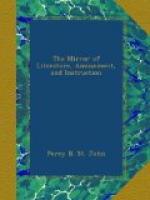There was an Italian painter who said that the secret of all effect in colour consisted in white upon black, and black upon white. How perfectly did Shakspeare understand this secret of effect! and how beautifully he has exemplified it in Juliet!
So shews a snowy dove trooping with crows,
As yonder lady o’er her follows
shews!
Thus she and her lover are in contrast with all around them. They are all love, surrounded with all hate; all harmony, surrounded with all discord; all pure nature, in the midst of polished and artificial life. Juliet, like Portia, is the foster-child of opulence and splendour: she dwells in a fair city—she has been nurtured in a palace—she clasps her robe with jewels—she braids her hair with rainbow-tinted pearls; but in herself she has no more connexion with the trappings around her, than the lovely exotic transplanted from some Eden-like climate, has with the carved and gilded conservatory which has reared and sheltered its luxuriant beauty.
But in this vivid impression of contrast, there is nothing abrupt or harsh. A tissue of beautiful poetry weaves together the principal figures and the subordinate personages. The consistent truth of the costume, and the exquisite gradations of relief with which the most opposite hues are approximated, blend all into harmony. Romeo and Juliet are not poetical beings placed on a prosaic background; nor are they, like Thekla and Max in the Wallenstein, two angels of light amid the darkest and harshest, the most debased and revolting aspects of humanity; but every circumstance, and every personage, and every shade of character in each, tends to the developement of the sentiment which is the subject of the drama. The poetry, too, the richest that can possibly be conceived, is interfused through all the characters; the splendid imagery lavished upon all with the careless prodigality of genius, and all is lighted up into such a sunny brilliance of effect, as though Shakspeare had really transported himself into Italy, and had drunk to intoxication of her genial atmosphere. How truly it has been said, that “although Romeo and Juliet are in love, they are not love-sick!” What a false idea would any thing of the mere whining amoroso, give us of Romeo, such as he is really in Shakspeare—the noble, gallant, ardent, brave, and witty! And Juliet—with even less truth could the phrase or idea apply to her! The picture in “Twelfth Night” of the wan girl dying of love, “who pined in thought, and with a green and yellow melancholy,” would never surely occur to us, when thinking on the enamoured and impassioned Juliet, in whose bosom love keeps a fiery vigil, kindling tenderness into enthusiasm, enthusiasm into passion, passion into heroism!




